
Editor Week for a Non-NYC Lit Agent
At almost every conference, authors want to know: does it matter if an agent is based outside of New York? Are New York agents better, more connected, more...something?
Well, if this was 1992, when my Dad had just bought my mom that 14K external modem (Hey, it was an upgrade. He almost bought the 7k), it might matter. But nowadays, so much of my work is done via email. I could be across the street from Simon & Schuster, but email is simply easier. I make friends with editors on twitter, I ask my agent friends in our google group who they’d sub a commercial historical to, etc, etc. It’s easy to connect, even 3,000 miles away.
But, there’s still a time and place for a face to face meeting, and at least once a year, I make the trek to New York for a week of non-stop, back-to-back-to-back meetings. It’s fun and grueling and crazy and I love it.
So how does one tackle a week long trip to visit every publisher in New York? With a game plan and a map, of course.
Firstly, I made this lovely map on google:
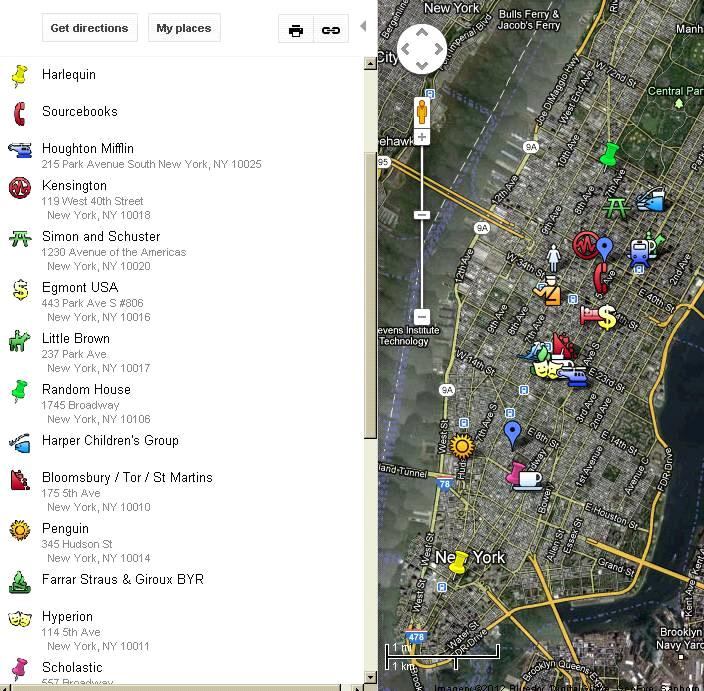
YOU KNOW YOU LOVE IT. How can you not love that Simon & Schuster is a picnic table and Macmillan is a helicopter? Admittedly, Harper got a raw deal and is a fish head. But everyone in publishing likes sushi so maybe it works. I don’t. Like sushi, that is.
I had to do it this way so that I could see at a glance who was where. The dozen little red pin points just didn’t help me figure anything out, so I assigned everyone easily recognizable symbols. There are also coffee cups and meal plates, but that’s because some folks don’t meet at the office. More on that later.
Once I had a map, the layout became clear. Random House and Harper would be visited on the same day. Macmillan and Hyperion could go together. Scholastic and Penguin were at the same end of town. So, I designated which days would be for which are of the city.
I divvied up the list, designating one morning for Random house before a short walk to an afternoon at Harper. On the next day I’d do a morning and lunch at Penguin, then an afternoon at Scholastic. You get the picture. I left Monday as my catch-all day, designating it for the publishers that were more scattered and/or certain editors I really wanted to meet that weren’t available when I was in their building.
I flew in Sunday night, arriving around midnight and walking about a dozen blocks to my hotel and realizing even though it didn’t seem that far I looked like an idiot tourist walking down dark streets that were silent except the sound of the squeaky rolling wheels on my suitcase.
The next morning, I started with tea with an Abrams/Amulet editor. She gave me the address to a coffee shop, so I put it on the map as a coffee cup. The tea was so hot it still burned my tongue an hour later, after the meeting was over. (Don’t these random details make you feel like YOU WERE THERE? No? Okay then.) Afterward, I had an amazing lunch in Bryant Park with a Kensington editor. May in New York is AMAZING, and we sat outside and I wish I was there right now. Afterward I went to a meeting with Harlequin teen—they’re clear down in the financial district, just blocks from Wall Street, requiring a taxi ride. (On the map above, they're the lone yellow pin at the south end of town). Every time I’m there, I visit ground zero. I ended Monday by having wine and cupcakes with a Simon Pulse editor who wasn’t available on our normal S&S day.
This is what Harlequin’s Lobby looks like:
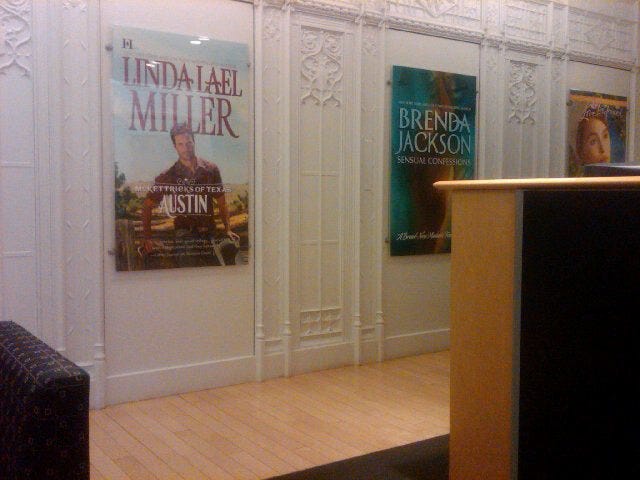
Don’t you love it? They swap out the book covers almost constantly with new releases.
In case you’re wondering who pays for the tea and the lunch and the cupcakes with wine, the protocol is that the publishers always pay. And writers, if you ever go to lunch/dinner/whatever with your agent, your agent will always, always, pay. If you go with your agent and your publisher, your publisher pays. It’s just one of those lovely old school things about publishing.
For the larger meeting days, I started with editors I absolutely knew I had to sit down with. A few of them were ones I’d sold books to, or they were my personal editors, or they were editors I just click with via email and phone. I started with those, only emailing one editor from each block of time (afternoon or morning). That way if that editor needed to move up or back by an hour or three , I still had the flexibility. It does make scheduling a challenge, however, as you have to hear back from those folks before moving on. Basically, to schedule 40 meetings in one week, you start the month before.
Once I’d confirmed my “anchors”, I began to fill in the remaining slots. Even at a singular publisher—like, say, Penguin—I can have 5 or 6 meetings with different imprints. Same building, different editorial groups. Sometimes on different floors. I might have a 30 minute meeting with one editor at Dial followed by coffee with an editor at Putnam and then lunch with three editors from Razorbill.
This is how I was able to set up dozens of meetings in a single week. It’s easy when you can have five meetings with five distinct imprints and they’re all in one building. Agents who work in NYC generally don't do this, becuase it's a little bit nutty and they have more opportunities for meetings, but out of town agents are able to put as many meetings in a single week as many NYC agents have in 6 months. It's neccessity for us to meet as many editors as possible to make the costly flights/hotel worth it.
Here are some random photos from my trips:
Lobby view while waiting for an S&S/Aladdin editor (and yes, that's Bob the Builder!):
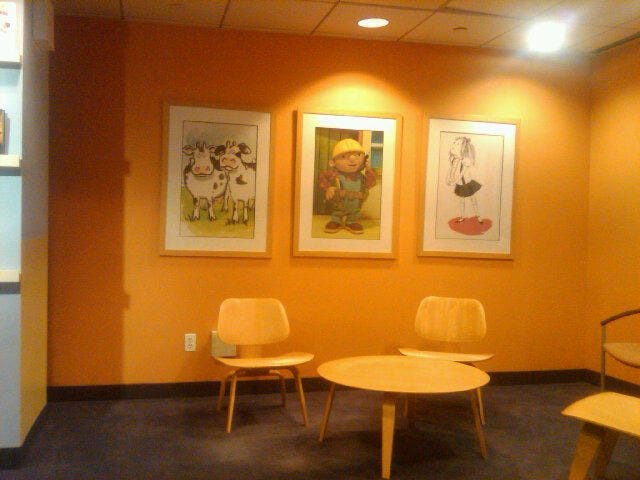
Random House from the sidewalk-- you can see their enormous bookshelves inside the lobby doors, and the Stieg Larsson poster outside:
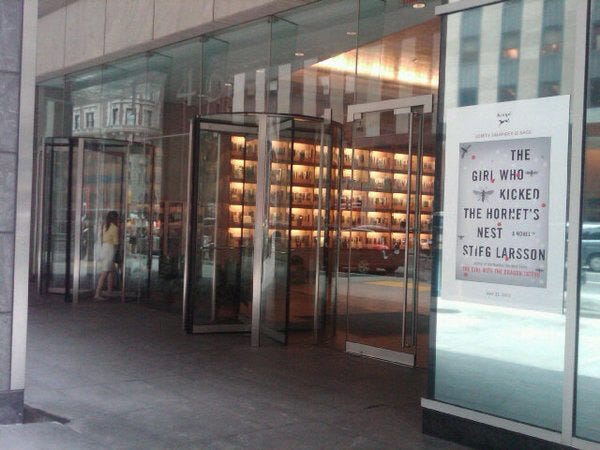
The Harper Collins gigantuous post:
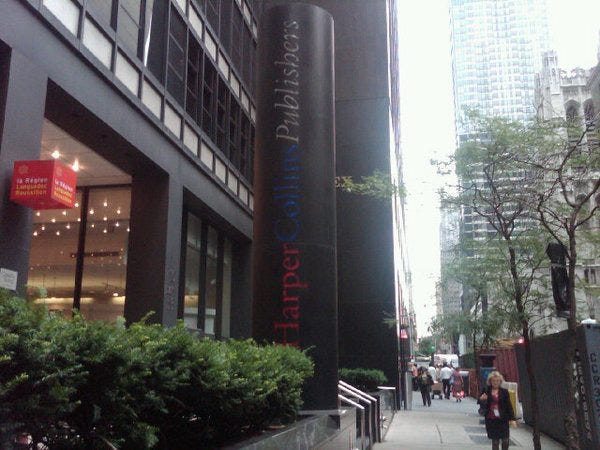
Here’s something else you should know about publishing in New York: they take their security seriously. You can’t get in the elevator without having a fancy badge to scan, and you can’t get a badge without visiting the security desk and checking in. If someone forgot to put you on the list, you’re not allowed up until they can get a hold of someone to verify you’re not a terrorist. Or something. I always try to remember to tell my first appointment at each publisher that they are my first appointment so that they remember to add me to the security list. Harper, Scholastic, Penguin, Random House, Simon & Schuster, they’re all this way. So, you know, don’t expect to show up there and randomly pitch your book to an editor. You won’t get within ten floors of her.
During each meeting, an agent first introduces herself (or himself) and talks about their background—how they became an agent, what kind of books they’re drawn to, etc. If you do these meetings with another agent, at some point they become comical because you could complete each other’s sentences.
Once that’s out of the way, the editor gives a similar spiel, but also talks about their publisher and what they love and what kinds of books the imprint is all about. If you’re at Scholastic paperbacks they’re going to talk about their paperback series, their commercial titles, etc. If you’re at Arthur Levine (also at scholastic) they’re going to talk about their new hardcoves, awards and starred reviews, with of course their ‘bestselling” titles highlighted too, but it’s almost secondary, because their focus is a bit different. They'll also talk about their acquistition process—whether they share an acquisition board with sister imprints, who reads the book before they buy it, etc.
They’ll show you covers that aren’t public yet (I saw PubCrawl's own Incarnate before it was public) and hand you ARCs to take home. (I have had to ship myself a box of books every time because by the end of the week I have about fifty books.) Editors will randomly pull books out of their book shelves and talk about what drew them to those titles, and you’ll figure out by the way they talk what they’re into—explosive plot twists, tension-filled romance, literary writing, etc.
That’s why these meetings are important. You learn to figure out how an Atheneum book differs from a Beach Lane book even though they’re both Simon & Schuster imprints. You figure out when you’d send Suzy editor a book instead of the editor sitting next to her, because you find out while they’re chatting that Suzy is a huge football fan and her associate is more into ballet.
I also love to ask editors what book they wish they had edited. It’s interesting, after 30-40 meetings in a single week, to see which titles come up more than once. Last May, long before it was an NBA finalist, I heard Chime by Frannie Billingsly. Over, and over, and over.
The primary focus is always to get to know their tastes and wants, but sometimes it’s inevitable to tell them about a client project, because they talk about how they used to play violin and you tell them you have a book you must send to them. So I always do end up with a handful of things to email off when I get home, but mostly it’s about figuring out what they want in a more general sense. My master editor sheet is more than 50 pages long, and it's always growing more complex. The week in NYC bolsters that considerably.
The meetings can be 30-60 minutes, or up to two hours if it’s a lunch meeting with more than one editor. Afterward you either part ways so that you can walk a few blocks to the next publisher, or the editor brings you back to the receptionist to ring your next appointment and it all starts over again.
Somewhere amidst all this, I remember how much I love my job. I see an editor’s eyes light up when I tell them your favorite book. I complain about that movie adaptation and how it totally didn’t nail the spirit of the book or how they left out your favorite character, and we get sidetracked for ten minutes talking about. it. I whine about how Veronica Mars needs to come back already, and they can't stop agreeing. I eat good lunch, I drink an obscene amount of coffee, and I smile so much your cheeks hurt. I walk dozens and dozens of blocks, until even Converse aren’t comfortable any more. I take two dozen pages of notes and type them all up when I get back home.
And I fall to bed each night dog-tired and impassioned.
So that’s how it generally goes, but if you have any questions, let me know! I’m happy to explain further.







